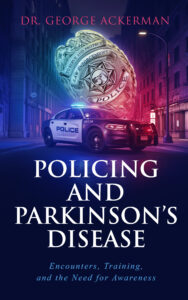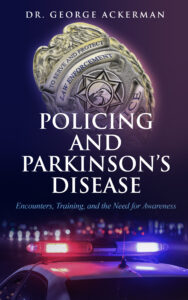Policing & Parkinson’s
Coming soon.. April 2025
Purchase a hard copy or online version below.

Policing & Parkinson’s Disease:
Encounters, Training, and the Need for Awareness.
Coming… Feb. 2025
Paperback & Ebook – Coming soon…….



Order a Copy Here
Paperback and Kindle (eBook) Coming soon – 2025
Dedication
Dedicated to the entire law enforcement community and Parkinson’s community because we are in this fight together for awareness and hope for a cure.
Dedicated Also to the memory of my mother, Sharon Riff Ackerman, who suffered with Parkinson’s disease for 15 years.
About the Book….
People with Parkinson’s disease (PD) and police often have unpleasant interactions that result from officers’ lack of awareness of the symptoms, for example, when tremors are mistaken for inebriation. In this research-based book, passionate Parkinson’s advocate Dr. George Ackerman describes initial police training and focuses on the great need in the law enforcement field for PD awareness. Officers’ shocking lack of awareness and symptoms can lead to highly unpleasant or even dangerous encounters for the PD sufferers. Through research, surveys, and interviews, Dr. Ackerman documents the lack of police training in PD and advocates its inclusion in all academy and in-service programs. Experiences of both police and PD citizens are recounted, and Dr. Ackerman offers advice and information to defuse potentially volatile situations, to counteract the fear of many people with Parkinson’s on meeting the police, and to promote mutual consideration and respect.
Endorsements:
As a former police officer, detective, and now a professor of criminal justice, I understand the critical need for awareness and education on nuanced interactions between police officers and the diverse communities they serve. Dr. George Ackerman offers a vital, research-driven exploration of an often-overlooked issue: encounters between people with Parkinson’s Disease (PwP) and law enforcement. Through its thoughtful examination of academy training gaps, officer insights, and real-world interactions, this book serves as both an educational tool and a call to action for law enforcement agencies to foster positive change.
Dr. Ackerman’s focus on equipping law enforcement professionals with the knowledge and skills to approach encounters with PwP thoughtfully and effectively is not only timely but essential. This work has the potential to shape how academies train recruits, influence ongoing officer education, and reduce anxiety for individuals with PD during police interactions. I highly recommend this book to academics, police organizations, and policymakers committed to fostering greater understanding and more effective community engagement in law enforcement.
Richard Dewey, Department Chair, Criminal Justice, Indian River State College. Former MSgt-Chief Investigator, USMC; Detective- Port St Lucie Police Department.
George Ackerman’s extensive experience in law enforcement, combined with his personal connection to caregiving for individuals with Parkinson’s disease, uniquely equips him to educate officers, patients, and the public on the complexities of the disease. His expertise fosters better interactions between individuals with Parkinson’s and the criminal justice system. With a strong academic background, he effectively researches complex issues and presents them in a clear, relatable manner, highlighting the significance of his work.
Robert Douglas PhD, Former law enforcement agent, Homeland Security, and Criminal Justice Educator.
The field of criminal justice is constantly having to adapt to new understanding of various health issues that can influence apparent behavior. Parkinson’s Disease presents another frontier in police and justice system responses. Any effort to fully research the effect this disease can have on what criminal justice professionals may face in the field is critical.
Dr. Camm Lounsbury, Executive Director, Salem University & Former Police Officer.
Dr. Ackerman’s Policing & Parkinson’s Disease: Encounters, Training, and the Need for Awareness is a groundbreaking contribution to the fields of criminology and policing. By shedding light on the critical intersection of Parkinson’s Disease and law enforcement, Dr. Ackerman offers an essential guide for improving training, fostering empathy, and enhancing outcomes for both police officers and individuals with Parkinson’s. This book is an invaluable resource for scholars, practitioners, and policymakers dedicated to advancing equitable and effective policing practices.
Dr. Wes Jennings, Chair & Professor, University of Mississippi & Member of the International Association of Chiefs of Police.
Dr. Ackerman’s new book provides critical insights into the challenges faced by individuals with Parkinson’s disease, offering practical strategies for recognizing symptoms, ensuring effective communication, and safely responding to situations in the field with cultural intelligence and compassion. A must-read for any first responder committed to protecting and serving with empathy, this guide bridges the gap between evidence-based research and practical application.
Scott Shaw, PhD, EdD, D.Min., LPC, LMSW, Dean & Professor, School of Business Innovation and Public Service, Grace Christian University. Former Law Enforcement Officer.
It is one thing to discuss, bringing more awareness about a problem; it is another to do something about it. Dr. Ackerman is exactly right when he says that research and awareness are sorely lacking on the topic of police and first responders interacting with people with Parkinson’s Disease. With both personal and professional insight, Dr. Ackerman charts a way forward to improve this situation. Well done, sir, and thank you for your dedication to this crucial public safety matter!
Shane Stone, Ph.D., Associate Professor and Criminal Justice Program Director, Colorado Christian University. Former municipal officer, Sheriff’s deputy, Missouri State Trooper, and a Criminal Investigator with the Missouri Department of Corrections. Military Policeman- Army National Guard
Table of Contents
Introduction……………………………………………………………………………………………………………
Chapter 1. Purpose of This Book……………………………………………………………………………….
Chapter 2. My Background in Law Enforcement and Police Reserve…………………………….
Chapter 3. The Signs and Symptoms of Parkinson’s Disease………………………………………..
Chapter 4. Policing and the Law……………………………………………………………………………….
Chapter 5. The Police Academy………………………………………………………………………………..
Chapter 6. Becoming and Officer………………………………………………………………………………
Chapter 7. Police Fundamentals………………………………………………………………………………..
Chapter 8. Present-Day Policies………………………………………………………………………………..
Chapter 9. Parkinson’s, Policing, and Mental Health……………………………………………………
Chapter 10. Community Policing………………………………………………………………………………
Chapter 11. Communication: The Police and the Community……………………………………….
Chapter 12. Where Is Police Training for Parkinson’s?………………………………………………..
Chapter 13. Avoiding Tragedy…………………………………………………………………………………..
Chapter 14. Public Policy…………………………………………………………………………………………
Chapter 15. Law Enforcement Officers’ Experiences With People With Parkinson’s……….
Chapter 16. People With Parkinson’s Experiences With Law Enforcement Officers………..
Chapter 17. My Mother, a PD Sufferer, and the Police…………………………………………………
Chapter 18. Research and Important Legislation on Parkinson’s…………………………………..
Chapter 19. Research on Police Officers With Parkinson’s…………………………………………..
Chapter 20. Parkinson’s Programs to Help Police and Other First Responders………………..
Chapter 21. Conclusions…………………………………………………………………………………………..
References……………………………………………………………………………………………………………..
Appendix A. People With Parkinson’s Medical Alert Card…………………………………………..
Appendix B. The Questionnaire: Police Officers, Deputies, and Agents…………………………
Appendix C. The Questionnaire: People With Parkinson’s……………………………………………
Appendix D. The National Plan to End Parkinson’s Act: The Journey




